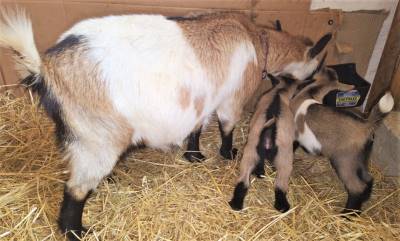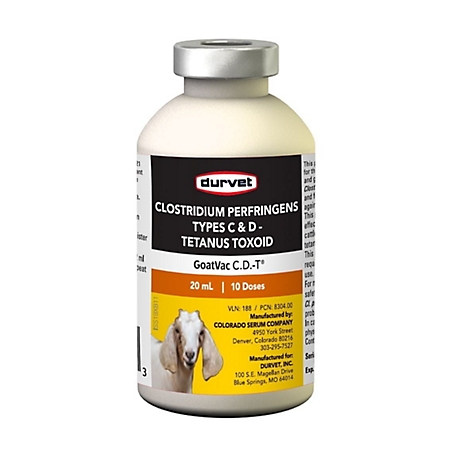Enterotoxemia (Overeating Disease)
Enterotoxemia (Overeating Disease)

This information is provided from Colorado State University Extension, D. Van Metre, DVM, DACVIM, Colorado State University Extension specialist (veterinarian) and associate professor, College of Veterinary Medicine and Biomedical Sciences, Clinical Sciences.
Quick Facts…
- Entertoxemia is a frequently severe disease of sheep and goats of all ages.
- Causative bacteria are present in relatively low numbers and appear to be in a relatively quiescent state in the normal, healthy animal.
- Treatment may not be successful in severe cases.
- Prevention of enterotoxemia is far more likely to be successful than trying to treat the disease.
Enterotoxemia is a frequently severe disease of sheep and goats of all ages. It is caused by two strains of bacteria called Clostridium perfringens – the strains are termed types C and D. These bacteria are normally found in low numbers in the gastrointestinal tract of all sheep and goats. If that is so, when and why do they cause disease?
These organisms are normally “laying low” in the small and large intestine – that is, they are present in relatively low numbers and appear to be in a relatively quiescent state in the normal, healthy animal. What appears to trigger them to cause disease is a change in the diet of the animal. Most commonly, the change that triggers disease is an increase in the amount of grain, protein supplement, milk or milk replacer (for lambs and kids), and/or grass that the sheep or goat is ingesting. Collectively, these feeds are rich in starch, sugar, and/or protein.
When unusually high levels of these nutrients reach the intestine, Clostridium perfringens undergoes explosive growth, increasing its numbers rapidly within the intestine. As the organism grows in number, it releases very potent toxins (bacterial poisons) that harm the animal. These toxins can cause damage to the intestine as well as numerous other organs. This can result in fatalities, particularly in the non-vaccinated animal or in the newborn lamb or kid whose dam has not been vaccinated.
The signs of enterotoxemia in goats include:
• The animals may abruptly go off of feed and become lethargic.
• Affected animals may show signs of stomach pain, such as kicking at their belly, repeatedly laying down and getting up, laying on their sides, panting, and crying out.
• Diarrhea may develop; in some cases, there is blood visible in the loose stool.
• Animals may lose the ability to stand, lay on their sides, and extend their legs, with their head and neck extended back over their withers.
This posture is caused by the effects of the toxins on the brain. Death
commonly occurs within minutes to hours after this sign is seen.
• Because enterotoxemia can progress so quickly, animals may be found dead with no previous signs of disease.
Treatment
Treatment of enterotoxemia may not be successful in severe cases. Many veterinarians treat mild cases with analgesics, probiotics (gels or pastes with “good bacteria), oral electrolyte solutions, and antisera, which is a solution of concentrated antibodies that neutralize the toxins that these bacteria produce. For goats this is an injection of C and D Antitoxin. More severe cases may require intravenous fluids, antibiotic therapy, and other types of supportive care, such as supplemental oxygen. The key is act early, act quickly.
Directions for use: Inject C and D Antitoxin SQ. Passive immunity lasts for up to 21 days. Must vaccinate with CD and T vaccine 14-21 days after giving Antitioxin.
Dosage:
Suckling kids and adult goats:
5 mL
Comments from one goat breeder: "This product will save lives. Not all vets carry this product. Look up enterotoxemia and the symptoms... the only anticdote is this product. The cd anti toxin can reverse the symptoms to the point of within 5 minutes the animal will be relatively back to normal. *if you give this product, it will negate the cdt vaccine.. REVACCINATE your animal with cdt 2 weeks after this product has been given. I will always have enough of this product to give every goat on my property just in case they get into something they shouldn't have."
Prevention
Prevention of enterotoxemia is far more likely to be successful than trying to treat the disease.
Vaccination
Vaccination is the cornerstone to prevention of this disease. For goats, there are multiple vaccines available that induce immunity to the toxins generated by Clostridium perfringens types C and D. Because tetanus is also an important disease to prevent in sheep and goats, many veterinarians recommend that goats be vaccinated with a vaccine that also induces protection against tetanus. These vaccines are often termed “three-way” vaccines because they induce protection against the three bacteria involved: Clostridium perfringens type C (enterotoxemia), type D (enterotoxemia) and Clostridium tetani (the bacterium that causes tetanus).
This vaccine may be purchased from Tractor Supply $11.99 or online: The Goat Vac CDT Goat Vaccine is for use in healthy goats as an aid in the prevention of and enterotoxemia caused by Clostridium perfringens types B, C, and D. Cl. Perfringens Type B is not a significant problem in the United States. This C.D.-T vaccine for goats provides long-term protection against tetanus and is a USDA approved tetanus shot for goats. This goat vaccine is safe for all life stages.
Adult goats: When initiating vaccination for a goat, all enterotoxemia/tetanus vaccines require two doses to induce effective immunity. These doses are usually administered 10 to14 days apart. Once each adult goat has received these two doses, repeat vaccination should occur at least once per year. Many veterinarians recommend that does be vaccinated roughly one to two months ahead of the anticipated birthing date, in order to maximize the amount of antibody present in the colostrum (first milk) – this helps to protect the neonate against enterotoxemia. If immunization of pregnant animals during that time frame is not feasible for you, then vaccinating the does at other times of the year appears to be effective.
For juvenile and adult goats fed diets rich in grain or allowed to graze lush pasture, more frequent vaccination for enterotoxemia may be warranted; some producers immunize these higher-risk animals two to four times per year to achieve adequate protection.
Vaccinating Kids:
Growing babies are usually vaccinated for the first time at four weeks of age, and one to two repeat (booster) vaccinations are typically given afterwards, at 8 weeks and 12 weeks. Consult your veterinarian to determine what vaccination strategy best suits your operation and feeding program.
Dosage of CD & T vaccination is 2 ml for kid or adult goat.
Reminder Note: Before disbudding a kid goat, you must give a tetanus shot, even if your doe was vaccinated before birthing. I have seen goat breeders not give the tetanus injection before disbudding and the kid ending up with tetanus.
Other Important Products to Keep in Supply:
ToxiBan
Activated charcoal is generally called the "universal antidote" by toxicologists. For use as a convenient treatment for poisoning by most organic chemicals in dogs, cats and large animals. In all cases of suspected poisonings, consult your veterinarian for complete diagnosis and specific treatment.



Powered by Boutique Store Builder . Web Design by Avalon Rose Design.


